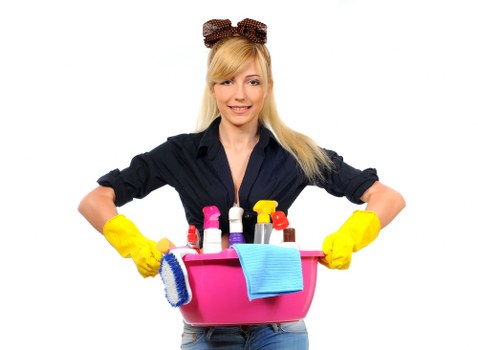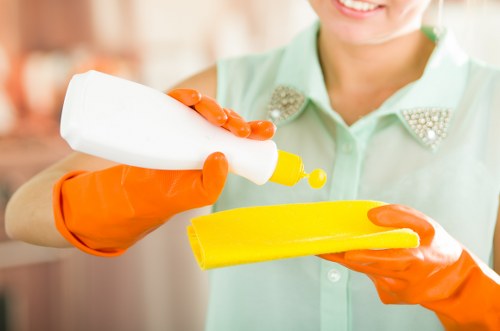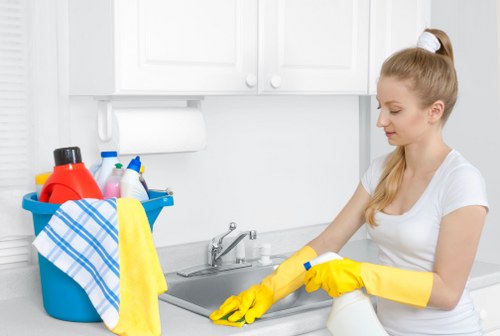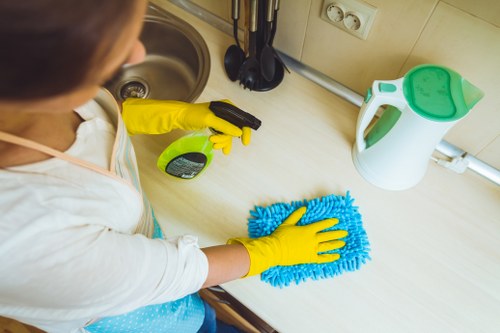Effective Cleaners for Kitchen Cleaning: Achieve a Sparkling Kitchen
Introduction to Kitchen Cleaning

The kitchen is often considered the heart of the home, where meals are prepared, and family gatherings take place. Maintaining a clean kitchen is essential not only for aesthetic purposes but also for health and safety. A clean kitchen reduces the risk of foodborne illnesses, prevents pest infestations, and creates a pleasant environment for cooking and socializing.
Choosing the right cleaners is crucial in ensuring that every surface is spotless and hygienic. From countertops and appliances to floors and cabinets, each area requires specific cleaning agents to effectively remove dirt, grease, and bacteria.
This article delves into the best cleaners for kitchen cleaning, providing tips and recommendations to help you achieve a pristine kitchen effortlessly.
Types of Kitchen Cleaners

Understanding the different types of kitchen cleaners available is the first step toward effective cleaning. Each cleaner serves a unique purpose and is formulated to tackle specific types of dirt and stains. Here are the primary categories of kitchen cleaners:
All-Purpose Cleaners
All-purpose cleaners are versatile products designed to clean a variety of surfaces, including countertops, appliances, and sinks. They are ideal for everyday cleaning tasks and can effectively remove light grease and grime.
Degreasers
Degreasers are powerful cleaners formulated to cut through tough grease and oil. They are especially useful in kitchens where cooking produces significant amounts of grease, such as around stovetops, ovens, and range hoods.
Disinfectants
Disinfectants are essential for eliminating harmful bacteria and viruses. They are crucial for sanitizing areas that come into direct contact with food, like cutting boards, sinks, and countertops.
Specialized Cleaners
Specialized cleaners target specific surfaces or types of stains. For example, stainless steel cleaners are designed to maintain the shine and prevent streaks on stainless steel appliances, while granite cleaners are formulated to protect and clean stone countertops.
Top Cleaners for Different Kitchen Surfaces

Different kitchen surfaces require tailored cleaning solutions to ensure they remain in excellent condition. Below are the recommended cleaners for various kitchen surfaces:
Countertops
Countertops are prone to spills, stains, and bacterial growth. An effective countertop cleaner should be able to remove sticky residues and sanitize the surface without causing damage.
- All-Purpose Cleaners: Suitable for most countertop materials including laminate, quartz, and granite.
- Natural Cleaners: Solutions like vinegar and baking soda are great for those who prefer eco-friendly options.
Stainless Steel Appliances
Stainless steel appliances can develop fingerprints, smudges, and streaks over time. Using a dedicated stainless steel cleaner helps maintain their shiny appearance and prevents corrosion.
- Stainless Steel Cleaners: Products specifically designed to clean and polish stainless steel surfaces.
- DIY Solutions: A mixture of olive oil and vinegar can also be effective in removing streaks and adding shine.
Floors
Kitchen floors are subjected to heavy foot traffic, spills, and dropped food items. Choosing the right floor cleaner ensures that they remain clean and safe.
- Tile and Grout Cleaners: Ideal for tile floors with grout lines that require deep cleaning.
- Wood Floor Cleaners: Formulated to clean without damaging the wood or stripping its finish.
- Vinyl Floor Cleaners: Safe for use on vinyl surfaces, maintaining their appearance and durability.
Eco-Friendly Kitchen Cleaners

With growing environmental awareness, many homeowners are opting for eco-friendly kitchen cleaners. These products are designed to be effective while minimizing their impact on the environment and human health.
Benefits of Eco-Friendly Cleaners
- Non-Toxic: Safe for use around children and pets.
- Biodegradable: Less harmful to the environment as they break down naturally.
- Reduced Chemical Exposure: Minimizes the risk of skin irritation and respiratory issues.
Popular Eco-Friendly Cleaners
There are numerous eco-friendly kitchen cleaners available, ranging from store-bought products to homemade solutions:
Store-Bought Options
- Seventh Generation All-Purpose Cleaner: A versatile and environmentally friendly option suitable for various surfaces.
- Method Kitchen Cleaner: Known for its pleasant scents and effective cleaning power.
Homemade Cleaners
- Vinegar and Baking Soda: A simple yet powerful combination for tackling grease and grime.
- Lemon Juice: Natural disinfectant and stain remover.
Specialized Cleaning Tools for the Kitchen

In addition to the right cleaners, using specialized cleaning tools can enhance the efficiency and effectiveness of your kitchen cleaning routine.
Squeegees and Window Cleaners
These tools are perfect for cleaning glass surfaces, such as windows, stovetops, and glass cabinet doors, leaving them streak-free and shiny.
Abrasive Sponges and Scrubbers
Ideal for stubborn stains and tough grease, abrasive sponges can help in scrubbing down surfaces without causing damage when used appropriately.
Microfiber Cloths
Microfiber cloths are excellent for trapping dust and dirt, making them perfect for wiping down countertops and appliances without leaving lint behind.
Steam Cleaners
Steam cleaners use high-temperature steam to disinfect and clean various kitchen surfaces without the need for harsh chemicals.
Cleaning Brushes
Various brushes, such as bottle brushes and grout brushes, help in reaching tight spaces and ensuring a thorough clean.
Safety Tips for Using Kitchen Cleaners
While cleaners make kitchen cleaning easier, it's essential to use them safely to prevent accidents and health issues.
Read Labels Carefully
Always read the labels and instructions of cleaning products to understand their proper usage, dilution ratios, and potential hazards.
Wear Protective Gear
Gloves and eye protection should be worn when handling strong cleaning agents to prevent skin irritation and splashes.
Proper Ventilation
Ensure that the kitchen is well-ventilated while using cleaners, especially those with strong fumes, to avoid respiratory irritation.
Store Cleaners Safely
Keep cleaning products out of reach of children and pets, and store them in their original containers to prevent accidental ingestion.
Avoid Mixing Cleaners
Never mix different cleaning agents, as this can lead to dangerous chemical reactions, releasing toxic gases or causing fires.
DIY Kitchen Cleaners: Recipes and Tips
For those who prefer homemade cleaning solutions, DIY kitchen cleaners offer a cost-effective and customizable alternative to commercial products.
Basic DIY All-Purpose Cleaner
Ingredients:
- 1 cup distilled water
- 1 cup white vinegar
- 1 tablespoon baking soda
- 15 drops essential oil (optional, for fragrance)
Instructions:
- In a spray bottle, combine the water and vinegar.
- Slowly add baking soda; the mixture will fizz.
- Add essential oil if desired, then shake gently to mix.
- Use as you would any commercial all-purpose cleaner.
Natural Degreaser
Ingredients:
- 1/2 cup baking soda
- 1/4 cup dish soap
- Hot water
Instructions:
- Mix baking soda and dish soap in a bowl.
- Add enough hot water to form a paste.
- Apply the paste to greasy areas, let sit for 10 minutes.
- Scrub with a sponge or brush, then rinse clean.
Lemon-Based Cleaner
Ingredients:
- 1 cup white vinegar
- 1 cup water
- Juice of 1 lemon
Instructions:
- Combine all ingredients in a spray bottle.
- Shake well and use to clean surfaces, leaving a fresh lemon scent.
- Rinse with water if necessary.
Tips for Effective DIY Cleaning
- Label your DIY cleaners clearly to avoid confusion.
- Test a small area first to ensure there is no damage or discoloration.
- Store homemade cleaners in airtight containers to extend their shelf life.
- Use natural fragrances like essential oils for a pleasant scent without harsh chemicals.
Maintaining a Clean Kitchen: Daily and Weekly Routines
Establishing a consistent cleaning routine can make maintaining a spotless kitchen manageable and less time-consuming.
Daily Cleaning Tasks
- Wipe Down Surfaces: Clean countertops, stovetops, and dining tables after each use.
- Wash Dishes: Ensure that dishes are cleaned or loaded into the dishwasher promptly to prevent buildup.
- Sweep the Floor: Remove crumbs and debris to keep the floor clean.
- Take Out Trash: Avoid unpleasant odors by disposing of waste regularly.
Weekly Cleaning Tasks
- Deep Clean Appliances: Clean the microwave, refrigerator, and oven thoroughly.
- Mop the Floor: Use an appropriate cleaner to mop and sanitize the kitchen floor.
- Clean Cabinets and Drawers: Wipe down the exterior and organize the interior.
- Sanitize Sinks: Remove stains and disinfect sink areas.
Monthly Cleaning Tasks
- Clean Behind Appliances: Move and clean areas behind the fridge and stove to remove hidden dirt and spills.
- Descale Faucets: Remove mineral deposits to maintain water flow and appearance.
- Organize Pantry: Check for expired items and reorganize storage for efficiency.
Seasonal Cleaning Tasks
- Deep Clean Cabinets: Remove all items and clean thoroughly, including the hardware.
- Replace Filters: Change filters in the range hood and any other ventilation systems.
- Inspect and Repair: Check for any signs of wear or damage and address them promptly.
Common Kitchen Cleaning Mistakes to Avoid
Even with the best intentions, certain mistakes can hinder your kitchen cleaning efforts. Being aware of these common pitfalls can help you maintain a more effective and efficient cleaning routine.
Using the Wrong Cleaner for the Surface
Not all cleaners are suitable for every surface. Using an inappropriate cleaner can cause damage, discoloration, or leave residues that attract more dirt.
Neglecting Ventilation
Skipping ventilation when using strong cleaning agents can lead to respiratory issues and prolonged exposure to harmful fumes.
Overusing Cleaners
Applying too much cleaner not only wastes the product but can also leave surfaces sticky or require additional wiping to remove residues.
Ignoring the Edges and Corners
Dirty edges and corners can harbor bacteria and attract pests. Ensure that these areas are not overlooked during cleaning.
Not Following Up with Rinsing
Some cleaners require rinsing to remove residues. Failing to do so can leave surfaces sticky and attract more dirt.
Using Dirty Cleaning Tools
Clean your cleaning tools regularly. Dirty sponges and cloths can transfer bacteria and dirt back onto surfaces.
Procrastinating Deep Cleaning
Regular deep cleaning prevents the buildup of grime and makes routine cleaning easier.
The Benefits of Professional Kitchen Cleaning Services
While regular maintenance is crucial, hiring professional kitchen cleaning services can offer several advantages, especially for those with busy lifestyles or extensive kitchens.
Expertise and Experience
Professional cleaners have the training and experience to handle various cleaning challenges effectively, ensuring that all areas are thoroughly cleaned and sanitized.
Time-Saving
Outsourcing kitchen cleaning frees up valuable time, allowing you to focus on other important tasks or simply enjoy your free time.
High-Quality Equipment and Cleaners
Professionals use advanced tools and high-grade cleaning products that may not be readily available to the average homeowner, resulting in better cleaning outcomes.
Customized Cleaning Plans
Professional services often offer tailored cleaning plans to meet your specific needs, whether it's a one-time deep clean or regular maintenance.
Health Benefits
A professionally cleaned kitchen reduces the risk of allergies, asthma, and other health issues by effectively removing allergens, bacteria, and mold.
Long-Term Cost Savings
Regular professional cleaning can extend the lifespan of your kitchen appliances and surfaces by preventing damage and reducing the need for costly repairs or replacements.
Stress Reduction
Knowing that your kitchen is consistently clean and hygienic can reduce stress and contribute to a more harmonious household environment.
Choosing the Right Cleaner for Your Kitchen
Selecting the appropriate cleaner for your kitchen involves considering several factors to ensure that you achieve the best results without causing damage to your surfaces or compromising your health.
Identify the Surface Material
Different surfaces require different cleaning agents. Understanding the material of your countertops, appliances, floors, and cabinets is essential in choosing the right cleaner.
Consider Environmental Impact
If sustainability is a priority, opt for eco-friendly cleaners that are biodegradable and free from harsh chemicals.
Check for Safety
Ensure that the cleaner is safe for use around food and does not leave harmful residues that could contaminate your kitchen environment.
Effectiveness Against Specific Stains
Some cleaners are specialized for certain types of stains. For instance, a degreaser is more effective on oily residues, while a disinfectant is necessary for sanitizing surfaces.
Ease of Use
Choose cleaners that are easy to apply and require minimal effort to use. Spray bottles, wipes, and concentrated formulas can make the cleaning process more convenient.
Price and Value
While high-quality cleaners might be more expensive, they often offer better performance and longevity, providing better value in the long run.
Read Reviews and Recommendations
Researching product reviews and seeking recommendations can help you make an informed decision based on the experiences of other users.
Innovative Cleaning Technologies for Kitchens
Advancements in cleaning technology have introduced innovative tools and products that enhance the efficiency and effectiveness of kitchen cleaning.
Robotic Cleaners
Robotic cleaners, such as autonomous floor scrubbers, can automate parts of the kitchen cleaning process, reducing manual labor and ensuring consistent results.
Smart Cleaning Devices
Smart cleaning devices equipped with sensors and connectivity features can optimize cleaning routines based on usage patterns and specific needs.
High-Efficiency Vacuum Cleaners
Modern vacuum cleaners with high-efficiency filters capture fine dust and allergens, making them ideal for maintaining clean kitchen floors and surfaces.
Steam Cleaning Technology
Steam cleaners use high-temperature steam to sanitize surfaces without the need for chemical cleaners, providing an eco-friendly and effective cleaning solution.
Ultrasonic Cleaners
Ultrasonic cleaners use sound waves to remove dirt and grime from surfaces, offering a deep clean that traditional methods might not achieve.
Self-Cleaning Appliances
Many modern kitchen appliances come with self-cleaning features, reducing the need for manual cleaning and maintaining hygiene effortlessly.
Advanced Cleaning Formulas
Innovative cleaning formulas designed to be more effective against specific types of stains, multitasking cleaners, and concentrated formulas offer enhanced performance and convenience.
Conclusion: Achieving a Spotless Kitchen with the Right Cleaners
A clean kitchen is a blend of the right tools, cleaners, and consistent maintenance. By understanding the types of cleaners available and their specific applications, you can ensure that every corner of your kitchen remains spotless and hygienic.
Whether you prefer eco-friendly solutions, specialized cleaning agents, or advanced cleaning technologies, selecting the appropriate cleaners can significantly enhance your kitchen cleaning routine. Additionally, incorporating regular cleaning habits and avoiding common mistakes will help maintain a pristine kitchen environment.
For those seeking a hassle-free approach, professional kitchen cleaning services offer expertise and convenience, ensuring your kitchen remains in top condition without the extra effort.
Contact us today to discover the best cleaning solutions tailored to your kitchen needs and enjoy a sparkling, healthy space that you can be proud of.